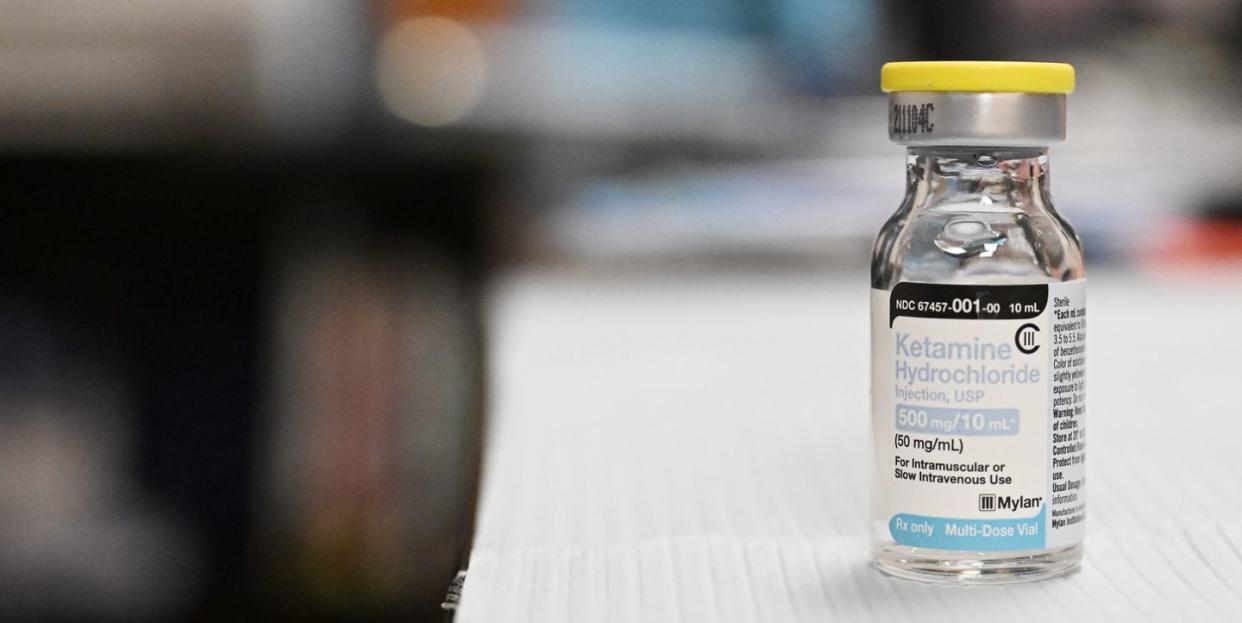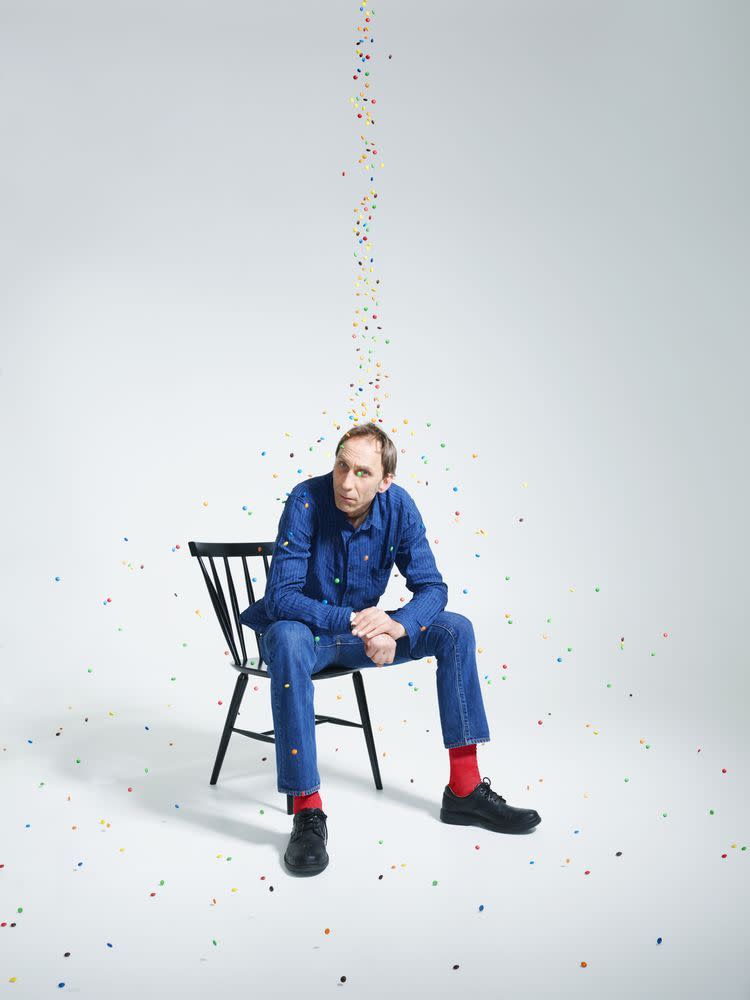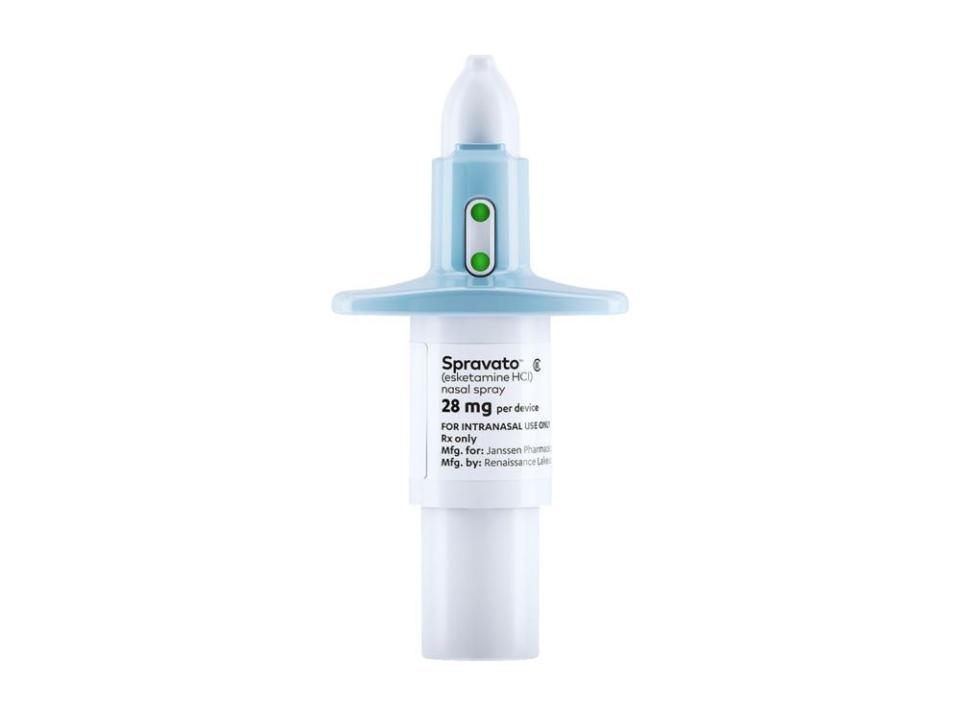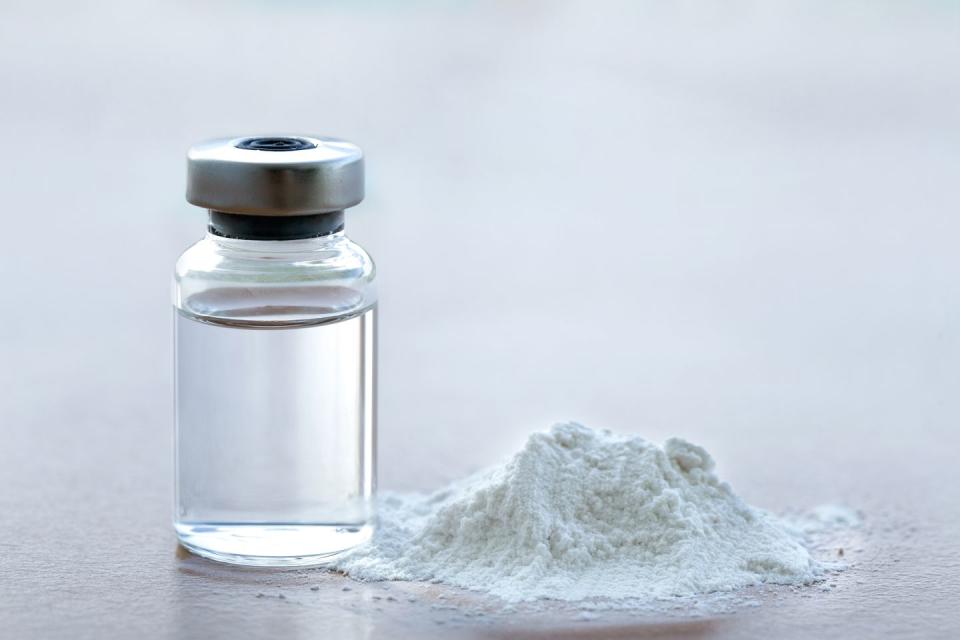Could Ketamine Be the Cure for Chronic Depression? MH Investigates

Sitting on top of the health pages on the BBC website reads the headline: Kent man with depression calls for ketamine prescriptions.
Simon Bottle is a businessman campaigning for the NHS to prescribe ketamine tor patients who have not responded to other forms of antidepressants. Speaking to the BBC, Bottle, who has lived with depression for 30 years, said: ‘One of the things that happened for me almost instantaneously was a feeling of a huge weight starting to be lifted off your shoulders, which I hadn’t felt in decades. It gave me a toehold initially, which turned into a springboard. That has been game changing.’
Trials in the US as well as Australia and at an NHS Hospital in Oxford have proven encouraging, and a number of professors are backing call for the NHS to use ketamine to treat drug resistant depression.
Here, Will Self, takes a look at ketamine, as well as a certain drug derived from and questions its effectiveness as a cure for choric depression.
A commendably to-the-point article in the Guardian last December put it like this: “A radical ketamine-like drug has been licensed for use in the UK for severe depression, a decision that offers hope to the millions of patients for whom conventional treatments have failed. Esketamine, taken as a nasal spray, is one of the first rapid-acting drugs for depression and the first in decades that is thought to work in a fundamentally different way in the brain. However, psychiatrists are divided on the benefits, with some hailing esketamine as a game changer and others raising fears about the potential for addiction and abuse.”
There’s only one word out of these 89 that I’d quibble with, and that’s the ugly, made-up adjective “ketamine-like”. If you believe the drug’s supporters – the ones hailing it as a game changer – esketamine has significant chemical differences to ketamine. These mean that it’s metabolised faster, while, unlike its prefix-free parent, it doesn’t bind to sigma receptors in the brain. As for those raising fears about the new treatment’s potential for addiction and abuse, many are inclined to see the difference between the two drugs in terms of profit margins.
Ketamine has been around for so long that its original synthesisers have lost their patent – it has become what is known in the drug world as “generic”. Having been used as an anaesthetic since the 1970s, recent tests have shown that it may be effective as an antidepressant. But no company will spend millions doing the necessary trials to make it a drug commonly prescribed for this malady, because it wouldn’t make any money out of it. Instead – these naysayers argue – Janssen, the pharmaceutical company behind the drug, has simply tweaked the molecules enough to make it possible to patent esketamine. Besides, what does it mean for the variant drug not to bind to sigma receptors? Nobody really knows – any more than they understand exactly what these receptors are for.
The analogy here might be with Spice. Yup, Spice: the fake weed you see homeless people monged out on. You’ll remember that Spice was introduced as a so-called legal high, before the government tightened up legislation to make tweaking illegal intoxicants to render them technically legal, um, illegal.
I’m sure Janssen, the company pushing esketamine, won’t thank me for the comparison, because one of the biggest PR problems it faces is that its potential money-spinner sounds very much like a recreational drug currently popular among Brit yoof. A drug of which it’s said, when people take too much, “Ooh, he’s in a K-hole.” How can this down-and-dirty description be squared with the shiny, happy world of marketing Big Pharma?
Medicating Melancholy
I suppose I should declare an interest here. Unlike the “experts” quoted regarding (es)ketamine, I can at least admit to having used the drug, albeit only once. It’s a shame, in a way, that this article isn’t about psilocybin – the active ingredient in magic mushrooms – being repurposed as an antidepressant, because I’ve taken shedloads of the stuff. Of course, for the experts in psychopharmacology, this would probably disbar my opinion from being seriously considered. But from where I’m sitting, looking at the gently undulating computer screen, the experiences of people who’ve actually used these psychoactive compounds are the ones I’d trust most.
It was in a bar in New York’s GreenwichVillage called Marylou’s – a fairly louche place, frequented by an upper-bohemian crowd of writers, artists and filmmakers, together with a fair sprinkling of higher-level criminals, or mafiosi, as they’re known. I was offered a line of white powder in the toilets by a man with a New Jersey accent and fewer fingers than he should have had. Assuming it was cocaine, I honked lustily. And, as the powder hit my mucous membranes, my fingers began to elongate, while the poky stall became as airy and overarching as the ticket hall at Grand Central.

This was the famous dissociation that ketamine imparts – and far from making me less unhappy, or more happy, for that matter, it seemed to me a very ominous feeling. I never took the drug again. Though I considered having some in order to reassess its effects – after all, it’s been a quarter of a century and, if truth be told, I’d already had a fair few dry Martinis and quite a lot of coke on that long-ago evening – I dismissed the idea.
Why? Well, I suppose that having admitted to being in a K-trench (if not an actual hole), I should declare another interest when it comes to rather more conventional antidepressants: I’ve taken quite a lot of them as well, beginning with the so-called tricyclic, amitriptyline. I was diagnosed with depression and prescribed these pills when I was 20; I took them on and off for the next six years. I can’t say I ever noticed any effect. I simply necked antidepressants like Smarties because I’d been told to by a doctor.
Then, in my late thirties, following my admission to the Charter clinic in London for depression, I was prescribed Seroxat, an SSRI. Three days later, I made a suicide attempt. When I returned to the psychiatrist who’d given me the drug, he dispensed three further psychiatric drugs (a sedative, a hypnotic and a tranquiliser) to, as he put it, “buffer the effects”. When I was passed the hefty bag of state-sanctioned, mood altering drugs across the pharmacy counter, I had an equally hefty epiphany: the happiest I’d ever been in my life was when I’d been taking no drugs at all.
I returned the bag to the pharmacist and asked her to dispose of them. From that day hence, for the past 20 years, I haven’t taken any such nostrums, unless prescribed by myself.
When the Drugs Don't Work
In 2013, I made a documentary for the BBC to mark the 25th anniversary of the synthesis of Prozac by research chemists at the drug company Eli Lilly. In a series of interviews with those prescribing and prescribed, an uncomfortable reality emerged. Sure, SSRIs “worked”, but no one really knew the precise mechanism of its action. Meanwhile, meta-studies of the double-blind trials conducted comparing these drugs to other possible treatments for depression revealed that they were, at best, marginally more effective in improving the mood of unhappy people than the following: having a heartfelt talk with a dear friend, a placebo, or taking a brisk country walk. (Exercise, in particular, does well against antidepressants. Indeed, given that the obesity pandemic seems to correlate with the rise in reported depression, I wonder if the two might by any chance be related?)
Worse still, studies have shown that SSRIs do rather worse at reducing depressive symptoms in patients – at least in the short term – than opiates such as heroin. So, you can see from this alone why the psychiatric profession and behind it Big Pharma are so keen to draw a line, even if it’s only a molecule thick, between their marvellous life-saving products and the Stygian depths of dreadful drug abuse.
I raise the subject of Prozac because its inception and dissemination was marked by the same sort of boosterism as now surrounds esketamine. If you’ll recall, the earlier drug had paeans written to it in book form, with titles such as Listening toProzac, wherein those ensorcelled spoke of their creativity being liberated and their relationships enhanced. As for their mood, unlike Freud’s psychotherapy, which only promised to replace “hysterical misery”with “common unhappiness”, this was a final and pharmacological solution to the perennial problem of human melancholy.
But then came the news of failed suicides such as my own (and, worse yet, successes), much talk of problems with withdrawal from the drugs, plus the aforementioned studies of the drug trials that had convinced regulators to allow SSRIs to become the drug on the market. This apparent pre-eminence was reinforced by statistics released in 2018 by the NHS showing that prescriptions forSSRIs had doubled in the previous decade, despite an allegedly vigorous campaign – joined in by the government and the Royal Colleges of both Psychiatrists and General Practitioners – to stop medics reaching for them as the first option.

By 2017-18, it was estimated that more than seven million Britons had received prescriptions for these antidepressants in that year alone. Figures released by the NHS last year were even more devastating:one in four Britons, it is now thought, have been on a repeat prescription for over a year of one of the following: SSRIs (antidepressants), benzodiazepines (sedatives), or opioids (painkillers). That’s a lot of addictive drugs being legally dispensed – or should I say “dealt” – by GPs and psychiatrists, not that they’d appreciate the synonym.
The Politics of Prescription
Psychiatrists who are vocal supporters of esketamine, such as Professor AllanYoung of King’s College London, would strongly resist the idea that there’s any equivalence between continuing to take a psychiatric drug because of the possibility of experiencing withdrawal symptoms and the compulsion to take other drugs because they get you high. I emailed Professor Young, then spoke to him briefly on the phone regarding esketamine. This was just after NICE (the National Institute for Health and Care Excellence), the British organisation responsible for the cost-benefit analysis of new NHS treatments, had recommended against esketamine being prescribed in the UK, thus going against both the European Commission and the US regulatory authority, the Food and Drug Administration.
“I believe it hinges on the cost,”Professor Young bellowed into his mobile.“Also, there weren’t any psychiatrists on the panel that made the decision, so the people who were made unwarranted assumptions that drive up costs, such as how long you continue with treatment in those who do respond well.”
We talked for a while about the trials’ parameters, then briefly about ProfessorYoung’s research into psilocybin as a possible treatment for both depression and PTSD. I mused that the presence of all manner of CBD products in the windows of British chemists suggested to me that marijuana decriminalisation lay in the near future. But the Prof wouldn’t be drawn on this, any more than he would on the most commonplace form of drug use for stress: I put it to him that having a couple of drinks when you arrive at a party is really a form of self medicating. He denied any equivalence between this and the former club drug he’s now promoting as an antidepressant, though he conceded this much: “When we do experiments with alcohol, we do have to administer it in the right sort of setting. There’s no point in sitting subjects down in a white tile environment. It’s all about setting.”
“All about setting”. These words stayed with me. His flight had been called; he was in Switzerland, I believe, en route back toLondon, where he was only stopping for a day before jetting on to the US. I would have liked to ask him about his own rapid changes of setting, given that his research has benefited from funding by, you guessed it, Janssen. But I also would have liked to challenge him over his use of “setting” to imply that the effect of a psychoactive drug is as much a function of the context it’s administered in, and the mindset of the person it’s administered to, as any baseline“chemical” action. This idea was pioneered not by any contemporary, Big Pharma-funded shrink but by the original, LSD powered psychonaut and one-time Harvard professor, Timothy Leary.
It is John Read, a professor of psychology at the University of East London, who drew my attention to Young’s involvement with Janssen – his sighs over the phone were almost as loud as the jet-howl in the background when I was talking to his opponent. “People like Allan Young genuinely don’t see their drug company involvement as a problem, or anything that biases their view,” he tells me. “They believe simply declaring the conflict of interest is sufficient, in some way, to obviate it.” By contrast, Read is one of those campaigning for a “Sunshine Act” in the UK, whereby all drug researchers in receipt of money from Big Pharma would be required to register any such interest.
Mind or Matter?
In a way, as with Prozac and other SSRIs – and in respect of what we might think of as far heavier psychiatric drugs, such as the antipsychotics and tranquilisers used to quiet the captious voices of the psychotic – the battle over esketamine is one long fought in the realms of the psyche, between what we might call the physicalists and the mentalists.
Professor Young, Janssen and all the boosters who have hailed esketamine as a solution to the seemingly epidemic levels of misery in our society seem to believe that the brain is all but synonymous with the mind, and a chemically healthy one means a happier person. They point to a physical hypothesis about the chemical action of esketamine to prove their contention, and a series of double-blind trials. They dispute the idea that SSRIs have “stopped working”, let alone that the underlying chemical theory of depression is unproven.
Their mentalist critics – such as Read – attack on several fronts at once. In the case of esketamine, they say that the trials haven’t been large or long enough, or offered sufficiently definitive results to justify the NHS ponying up £10,000 per patient for a single course of treatment with the new wonder drug. But more than this, they challenge the underlying philosophy of their opponents, cleaving to a view of psychopathology that sees mental illness as a function of what we might call set and setting: the affective disposition of the sufferer and the sociocultural setting in which he lives.
It’s these aspects of mentalism – as I think of it – that would incline you to expect its adherents to be rather more latitudinarian when it comes to the distinction between the K hole and the giddy heights of esketamine-alleviated depression. Yet Read, and the other experts who wrote a letter to the Medical and Healthcare Products RegulatoryAuthority last October, objecting to the possible licensing of the drug, cited the dangers of dependency and made an explicit comparison between esketamine and street drugs. “The short term apparent benefits of using esketamine are unsurprising, given its similarities to drugs of abuse, and no basis for approving a drug,” it read. “One could achieve similar results... with various other street drugs. We are as shocked by this recent development as we would be had es-cocaine been submitted for approval.”
At the time of writing, the stand-off between the two sides continues. Of course, if the NICE decision is reversed on appeal, you don’t need to be a cynic to wonder at the fact that Janssen is already the drug company that sells the most products into the NHS, and also provides the most training to NHS staff. But nor do you need to be a cynic to find something a little iffy about the mentalists as well.

Psychologists, psychotherapists and psychoanalysts often object to the double-blind trials that are the gold standard for approving new drugs because they can’t use the therapies they themselves offer asa comparator. After all, how can you make a direct equivalence between one person’s relationship with a given therapist as against another’s with another? Moreover, the talking therapies are notoriously long-lasting affairs – hard to swallow without many glasses of water over many months, if not years. From the physicalist perspective, these couch pushers are simply spinning out their depressed clients’ woes, while being subject to no methodological – let alone scientific –rigour at all. So, who are the true exploiters here, and who the true healers?
Turf Warfare
In my view, the right theorist to reach for to solve this conundrum isn’t mentalist Sigmund Freud or physicalist Alexander Luria (the founding father of modern neurology), but a sociologist, Max Weber.His concept of closure has much to tell us about the behaviour of all these professionals. For Weber, social groups constitute themselves – and preserve their integrity – by seeking to exclude all others.In the case of cultural, religious or ethnic groups, this may be done with a ritual or ashibboleth; with the professions, it tends to be by cause of qualifications, membership of associations, and the rights thereby derived. Put simply, what we’re seeing with esketamine is a turf war between different kinds of shrinks over their resource base.And what is their resource base? Why, the depressed patient, of course.
You might think that, given all the statistics bandied about thus far, these pissed-off punters can’t be in short supply.But think on this: up until the Second World War, there were scarcely any psychiatrists or psychotherapists, whereas now there are vast legions of them, all searching for more depression to treat.
As for their competitors, I’d argue that they aren’t each other at all, but those things that did almost as well as psychopharmacology (and probably psychotherapy, too) when it came to alleviating depression: exercise, intimacy and the sort of drugs you buy from men with writing on their tracksuit trousers, not letters after their name. After all, what’s more depressing than living in a world in which all these experts are required to stop us growing more and more miserable in greater and greater numbers? One in which the drugs work – if at all – because they’re doled out by medical authority figures, and we have to pay someone to sit there and listen to our problems?
No, I think my intimation in that Greenwich Village toilet stall a quarter of a century ago was the right one. But it isn’t ketamine that makes this world of ours seem simultaneously so big, and so small, and so threatening: it’s our social reality that’s so twisted.
You Might Also Like


